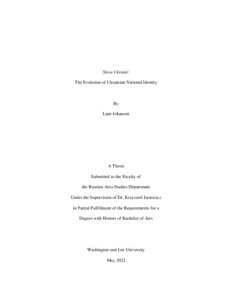The Evolution of Ukrainian National Identity (thesis)

View/
Author
Johansen, Lane Elizabeth
Subject
Washington and Lee University -- Honors in Russian Area Studies
Ukraine
Nationalism
International relations
Metadata
Show full item recordDescription
Thesis; [FULL-TEXT FREELY AVAILABLE ONLINE] Lane Elizabeth Johnansen is a member of the Class of 2022 of Washington and Lee University. When Vladimir Putin launched his full-scale invasion of Ukraine on February 24, 2022, Ukraine became more unified than ever before, decisively linking its identity to freedom and democracy. Careful analysis of how Ukraine has responded in the face of existential threats throughout its history -- increasingly unifying and considering itself a modern European state -- reveals why Putin's decision to launch a full-scale invasion of Ukraine with the assumption of a swift victory was one of the greatest strategic blunders in Russian history. Using an analysis and comparison of the literature, public opinion survey data, and presidential and parliamentary electoral results before and after the watershed year of 2014, I find that Ukraine's three revolutions since 1990 -- as well as response to the current war with Russia -- can be considered successive stages of nation-building. Throughout this process, Ukrainian national identity has evolved from a negative definition (i.e., "we are not Russia") to a positive definition (i.e., "we are a modern, democratic Ukraine") intrinsically tied to Euro-Atlantic integration. This civic national identity has diffused across the country and -- catalyzed by intensifying Russian aggression -- largely avoided polarization and instead effectively unified Ukrainians, drawing legitimacy from its hybrid character. With an end to macro-regional polarization in Ukraine after 2014, this civic Ukrainian national identity can be considered to have become hegemonic in the country, a development that helps explain the erroneousness of conflating Russian ethnolinguistic background with a pro-Russian political orientation. Lane Johansen